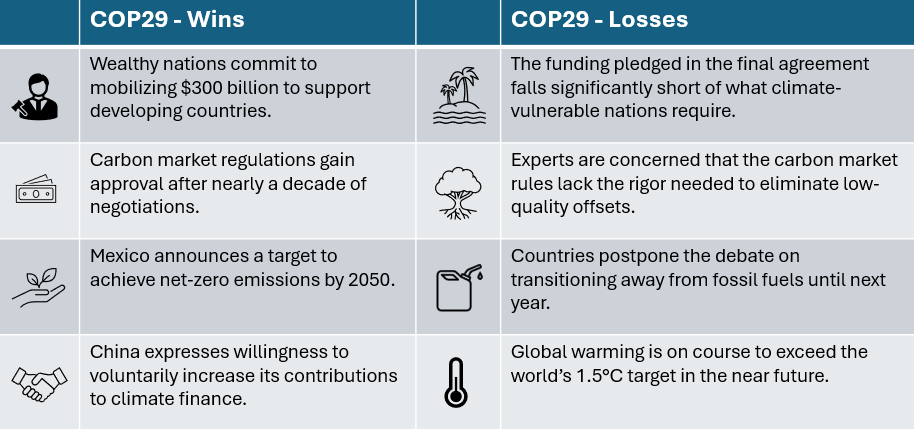COP29: A Step Forward in Climate Finance and Carbon Markets, But Challenges Remain
This is a marketing communication.
The 2024 United Nations Climate Change Conference (COP29), held in Baku, Azerbaijan, concluded last week with significant developments. This year’s focus was on climate finance, particularly addressing the needs of poorer nations most impacted by climate change. With this in mind, it wasn’t until the final moments of the conference that a breakthrough agreement was reached to triple climate financing for developing economies, increasing funds from $100 billion to $300 billion annually by 2035. These funds, sourced through bilateral and multilateral deals, aim to help vulnerable nations confront the escalating effects of climate change. While this commitment is a milestone, its success hinges on whether wealthy nations follow through on these pledges.
Another major highlight was the adoption of a new carbon credits framework, marking the end of nearly a decade of discussions. The framework, overseen by the United Nations, enables countries and companies to trade carbon credits while implementing an accounting system to ensure transparency and prevent double counting. However, concerns remain. Some industry campaigners argue that the rules for carbon credits lack rigor, potentially allowing for the trading of credits with minimal environmental benefit.
As the dust settles on COP29, attention now shifts to the implementation of these landmark decisions and whether they will deliver on their promises. A few more key takeaways are listed below:

As COP29 concludes, it is clear that while significant strides have been made in addressing climate finance and carbon markets, there remains much work to be done. The agreements reached are promising steps toward global collaboration, but the gap between commitments and action persists. Climate policy must continue to evolve to hold nations accountable, address systemic inequities, and ensure that emissions reductions are meaningful and impactful. The path forward will require not only sustained political will but also innovation, transparency, and an unwavering focus on equity to meet the urgent challenges posed by the climate crisis. COP29 has laid important groundwork, but the hard work of implementation and ambition lies ahead.



 Aidan Graver
Aidan Graver